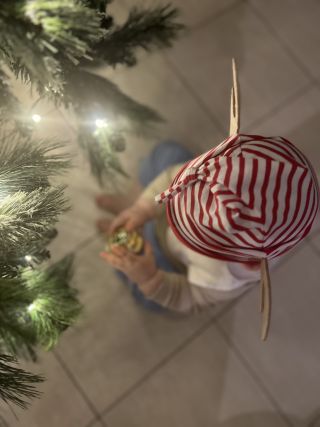Co-authored by Kristin Mariella Fridjonsdottir and Rachel Samson, M.Psych (Clin)
The holidays are a magical time of year, but for many parents with small children, the choice about how to talk to children about Santa can pose a real dilemma. As adults, we tend to think in terms of “black and white” when it comes to how to talk to our kids about Santa. In the clinic and in our online communities, we hear from many parents who feel like they only have two choices: lie and tell kids Santa is real or be honest and ruin the magic of Christmas. But what if there was another option? What if there was a way to embrace the magic of Santa Claus without being dishonest?

Baby sitting by Christmas tree.
Source: Supplied by authors.
In this post, we will explore a third option and outline how it is possible for our children to believe in Santa without believing he is real.
Before we dive in, it’s important for us to say that there isn’t a right or wrong way to celebrate Santa in your home. Whether you tell your children Santa is real or you don’t, if it works in your family, it works. There isn’t any need for you to change what you are already doing. This post is for the new parents and the parents of young children who we hear from each year who don’t want to tell their children Santa is real, but worry that if they are honest, they will deprive their children of Christmas magic.
So, what is the third option? This option involves being honest about Santa. When kids ask directly whether Santa Claus is real, parents tell them the truth: “No, Santa isn’t a real person like me and you. He doesn’t really live at the North Pole with a bunch of cute little elves and reindeer, and he doesn’t really fly around the world in one night jumping down chimneys and delivering gifts. This is a magical story that a lot of people love to pretend is real when it’s Christmas time.”
Here’s the thing: Children don’t need things to be real to enjoy them. Children are not completely reality-orientated; they have rich imaginations and can be highly creative, allowing them to easily inhabit a place of magic, daydreaming, and pretending. Consider for a moment how much delight a young child gets from playing tea parties. There is not any hot tea in the teapot; it is often completely empty during tea-party play, and yet a young child will still carefully—or not so carefully—lift the pot pretending to pour make-believe tea into the teacups. The child knows there is no real tea in the tea pot, but they delight in the play just the same. Perhaps as well as imaginary tea, there is also imaginary cake and biscuits to serve the tea with. We don’t have to tell our child the imaginary tea in the teapot is real for them to enjoy it. In fact, the mutual aspect of the imaginative play where we join our children in the imaginary play is in itself a source of delight for children.
In the same way, children can enjoy the magic of Santa even when they know Santa is not a real person. Children who know Santa is not real still like to enjoy the story and make-believe around Santa. They can still enjoy stories about Santa and engage in imaginative play, pretending Santa and his elves are up there in the North Pole hard at work making gifts, and still can leave cookies and carrots for Santa and his reindeer on Christmas Eve. When it comes down to it, the most important thing isn’t whether Santa is real or not—it’s all about the space we create around the story.
Some questions you may want to reflect on for how you will bring the magic of Santa into your home:
- Will we read stories about Santa and Christmas together during the holidays?
- Will we watch Christmas movies about Santa in the lead-up to Christmas?
- Will we play games about Santa and his elves working in the North Pole?
- Will we leave real/imaginary food for Santa and his reindeer on Christmas Eve?
- Will we help our children write a letter for Santa that is left out for him to read?
Ultimately, the way you talk about Santa Claus in your home is a very personal choice. If you decide to tell your children that Santa is not a real person, you may want to also explain to them that other children do believe that Santa is real and guide your children on how to respect the different beliefs other children have about Santa.
While we can’t tell you what is right for your family, we can remind you that when it comes to how you talk about Santa with your children, there are more than two options: If you don’t wish to tell your children that Santa is real, remember children can enjoy the magic of Christmas even if they know Santa is not real.


















+ There are no comments
Add yours